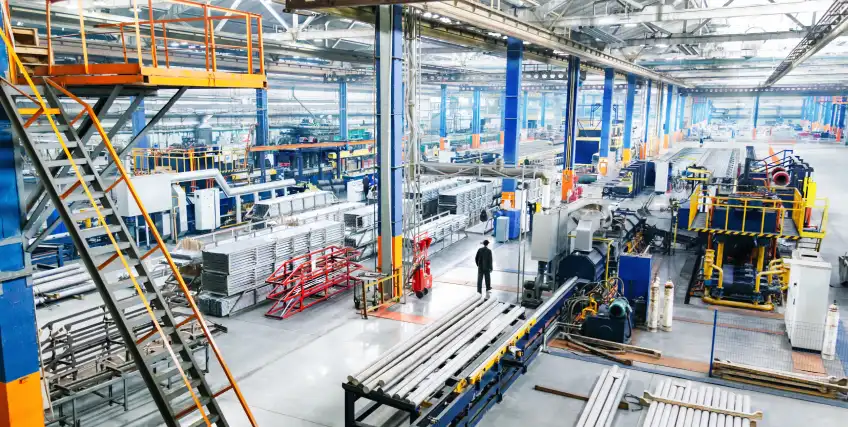Funding Supply Chain Needs in Manufacturing
July 04, 2025 | Last Updated on: July 07, 2025

Today's fast-paced (and often unpredictable) manufacturing environment requires a well-functioning supply chain, if your business wants to succeed. Whether you're sourcing raw materials, expanding your factory, or upgrading machinery, disruptions in the supply chain can lead to delays, missed deadlines, and lost revenue.
Modern financing for manufacturers can help small businesses meet these working capital and funding gap needs. This means more opportunity to maintain operations, scale production, and even stay competitive despite cash flow issues.
Here’s a look at the best loan options available to manufacturers, common eligibility requirements and how to choose the right manufacturing financing solution for your business needs.
Manufacturing Supply Chain Financing Challenges
The manufacturing industry is capital-intensive and typically operates on very tight margins. Even the most well-run businesses can face liquidity challenges, due to the complex and interconnected nature of their supply chains.
Some of the most common pain points for manufacturing businesses include:
- Volatile raw material costs: Steel, plastics, and other materials can unexpectedly spike in price, making procurement more expensive.
- Long payment cycles: Manufacturers often have to pay their suppliers before they receive payments from customers, creating a cash flow gap.
- Inventory and logistics: Just-in-time inventory models require precise coordination and adequate funding to function.
- Transportation expenses: Shipping delays or price surges can eat into profits and stall production.
These types of challenges can put pressure on even the most successful businesses, especially when demand is high and/or supply is tight. Relying exclusively on existing cash reserves or traditional business loans and lines of credit can be insufficient, which is where manufacturing business loans and specialized financing options come into play.
Why Manufacturers Need Specialized Financing
Unlike other types of businesses, manufacturers must balance long production lead times, capital expenditures, and a high volume of inventory purchases. Without proper funding, growth opportunities can be missed, and operations can grind to a halt. There’s why specialized financing for manufacturers is essential.
Large upfront costs such as new equipment, tooling, supplies, and marketing can eat away capital long before a product is ever sold or shipped. It can also take months from the time raw materials are ordered to when finished products are sold and paid for, leaving business owners holding the bag without any incoming cash flow.
Businesses that want to scale production may need to invest in new machinery or even secure a loan for the construction or purchase of new manufacturing facilities. These capital needs often exceed a business’s cash reserves, which is where tailored financing for manufacturers can bridge the gaps.
Popular Funding Options for Supply Chain Needs
So, where should manufacturing firms turn, whether they need funding for everyday business operations or want to break into new markets but can’t afford the operational costs? Here are some options to consider when it comes to financing for manufacturers.
Working Capital Loans
Working capital loans provide financing for manufacturers with short-term needs, such as covering day-to-day expenses, making inventory purchases, sending vendor payments, making payroll, or just paying rent. These loan programs are particularly useful for managing seasonal fluctuations or unexpected financial needs that arise, like emergency repairs or unplanned operational expenses.
Working capital loans can be structured as term loans or revolving business lines of credit for business borrowers. They are available through many traditional banks, credit unions, and online business lenders, and business borrowers who demonstrate creditworthiness can often snag flexible repayment terms and fast funding.
Manufacturing Equipment Loans
A manufacturing equipment loan is a form of equipment financing that is catered specifically to manufacturing businesses. This form of financing for manufactures can be used to purchase or upgrade the various machines, tools, and technology used in the production process.
Whether you need CNC machines, injection molding systems, or robotic arms, this type of loan helps spread the cost over time. The equipment purchased serves as collateral for this type of financing, too, and since secured loans may come with lower interest rates, borrowers will often pay less for the loan.
Manufacturing equipment purchases may be fully tax deductible in the year of purchase, too, thanks to Section 179. As long as your business and the equipment purchase qualify, this can save your business a lot of money come tax time. However, it is best to consult a tax professional before taking any decisions.
Lines of Credit
A business line of credit gives manufacturers ongoing access to revolving funds that can be used as and when needed. This form of financing for manufacturers is particularly helpful when dealing with unexpected price increases, rush orders, or last-minute inventory needs, especially if you don’t have time to deal with a lengthy loan application process.
A line of credit acts similarly to a credit card: Once established, the credit is available to be used whenever you need it, even as a financial safety net. Your business can borrow when expenses come up, repay the balance, and then borrow again later one. If you don’t borrow against the line of credit, you won’t pay any interest.
Lines of credit offer flexibility that’s simply unmatched by traditional term loans, making them ideal for manufacturers facing unpredictable costs.
Invoice Factoring or Financing
Many manufacturing businesses operate on net-30, net-60, or even net-90 payment terms. While waiting to get paid by customers is common, it can lead to a cash flow pinch that’s hard to manage.
Invoice factoring lets you sell unpaid invoices to a third party lender at a discount, in exchange for quick cash. The lender will then take over collection of those outstanding invoices, so you can move on with managing your business.
A similar option is invoice financing, or accounts receivable financing. Like invoice factoring, this lets you borrow against your outstanding customer invoices, giving you access to cash now rather than waiting for payments to come through. Unlike factoring, though, you maintain control of your customer accounts and are responsible for tracking down payments as they’re due.
Business Loans for Factory Construction or Expansion
As demand grows, many manufacturers feel the need to expand their footprint by building new facilities or retrofitting existing ones. A loan for factory construction can offer financing for manufacturers that want to grow but don’t have the capital necessary to fund it upfront.
These factory construction loans cover things like land acquisition, construction, renovations, and permits. They are typically secured by real estate and may come in several forms.
- Small Business Administration (SBA) 504 loans are ideal for fixed assets like property and machinery, with loan amounts of up to $5 million.
- Commercial real estate (CRE) loans are offered by banks and private lenders and can be used for acquisition, development, and construction.
How to Choose the Right Financing for Manufacturers
So, how do you pick the right funding option for you and your business? There are a few key factors to consider.
- Do you need short-term or long-term funding? This can also affect the variable or fixed-rate you’re offered.
- What can your manufacturing business afford, especially in terms of monthly payments?
- What can you qualify for, based on important factors like your business’s age, credit score, financial health, and credit history? SBA loans are notorious for requiring a strong business plan and plenty of financial statements, so be prepared.
- How soon does your business need cash? An existing business line of credit offers better financing for manufacturers facing an immediate need, while term loans could be more affordable for businesses that can handle a longer application process.
- How much do you need to borrow? A manufacturer requiring millions might be better served by an SBA 7(a) loan — which maxes out at $5 million — while a term business loan with a much lower limit could be the better choice for financing for manufacturers with smaller needs.
What’s Necessary When Getting Financing for Manufacturers
How much you plan to borrow, the type of loan you choose, and the lender you pick will affect not only the application process but what’s required of you along the way. Expect that most lenders will evaluate your manufacturing company’s credit profile, past financial performance, and operational stability before approving any loan, and will likely request documentation to support each of these.
Some common requirements when underwriting financing for manufacturers include:
- Two or more years in business (strong startups may still qualify in some cases)
- Minimum annual revenue thresholds (often $100,000 or more, though this varies by lender and loan)
- Healthy personal and business credit scores
- A strong business plan or use of funds statement
To support this, expect lenders to ask for your most recent years’ tax returns, bank statements, balance sheets, profit and loss statements (P&Ls), and accounts receivable aging reports. If you’re using the loan to purchase equipment to expand your manufacturing business, the lender may ask for equipment quotes, lease agreements, or construction estimates.
To improve your chances of approval, you should keep your business’s debt-to-income (DTI) ratio low. Build strong supplier and customer contracts and maintain detailed records of both your company’s inventory and production outputs. Also be sure to make any debt payments on time, every time to keep your business credit score healthy.
Final Thoughts
The manufacturing industry can be both competitive and unpredictable, and the ability to fund your supply chain needs efficiently and in the midst of unexpected hiccups can make or break your business. From flexible working capital loans to targeted manufacturing equipment loans and long-term factory construction financing, there are many solutions available when it comes to financing for manufacturers.
To figure out which form of financing for manufacturers is right for you, assess your operational needs and understand your current cash flow, then create a strong plan for your future growth. Whether you’re ramping up the production lines, investing in automation, or building a brand new facility, choosing the right loan for a manufacturing company like yours can mean the difference between staying stagnant and jumping ahead of the competition.
FAQs about Financing manufacturing supply chains
What types of financing for manufacturers are available?
Manufacturers can choose from a number of financing options, including working capital loans, manufacturing equipment loans, business lines of credit, invoice factoring, and loans for factory construction or expansion. These are available through traditional lenders, credit unions, online lenders, and more.
What is an ideal loan for a new manufacturing company?
If you have a limited business and financial history, qualifying for financing as a manufacturer can be difficult. Startups may be best served with equipment loans (since the machinery acts as collateral), microloans, or SBA loans like the 7(a) program. Eligibility depends on your business plan, credit history, and capital needs.
How does a business line of credit work for manufacturers?
A line of credit gives manufacturers access to flexible, revolving funds, similar to a credit card. Borrow only what you need (when you need it), repay as you go, and then reuse the credit limit without reapplying if you need more later on. This makes a line of credit perfect for managing fluctuating supply chain expenses, covering labor costs, or just bridging the budget gap during a slump.
How can a manufacturing equipment loan help my business?
A manufacturing equipment loan lets you to purchase or upgrade machinery that your business needs for production. This financing for manufacturers is often secured by the equipment itself, unlocking lower interest rates, better terms, and sometimes tax benefits under Section 179.
What’s the difference between invoice factoring and invoice financing?
With invoice factoring, you sell your unpaid invoices to a third party at a discount for immediate cash. Invoice financing also lets you borrow against those receivables, but you’ll still manage the customer relationships and invoice collections yourself.




